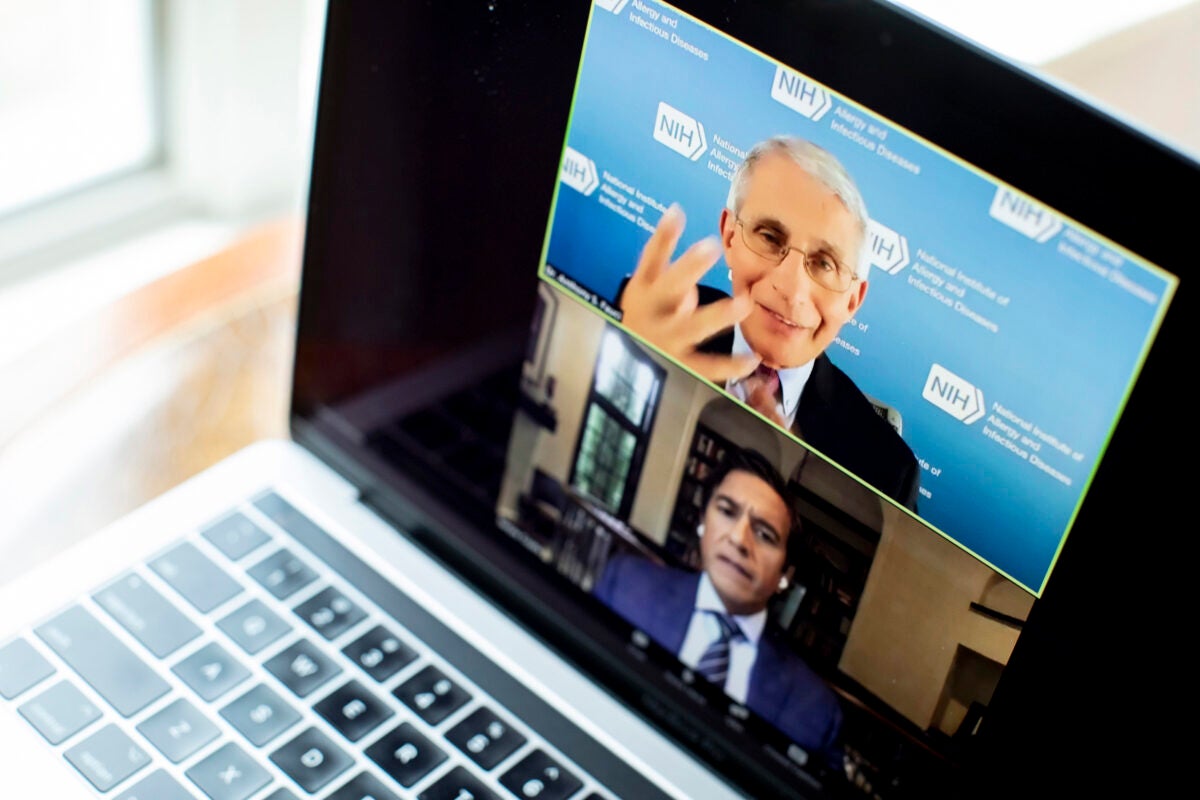Health
How halt in funding hurts efforts to ensure safety of patients in medical research
Stop-work order disrupts system that facilitates oversight of studies happening at multiple sites
The Trump administration’s freeze of more than $2 billion in federal research grants to Harvard has disrupted work in a number of areas, including efforts to ensure the rights and safety of patients who take part in medical studies.
The administration sent the University a stop-work order for the SMART IRB federal funding contract on April 14. The notice came hours after Harvard rejected government demands that included changes to governance and hiring practices and “audits” of viewpoints of students, faculty, and staff, among other measures.
SMART IRB is a national system administered by a Harvard Catalyst team along with other collaborators. It is used by hospitals, universities, and federal agencies to facilitate oversight of medical research taking place at multiple sites.
Barbara Bierer is the principal investigator and program director of SMART IRB and director of the Regulatory Foundations, Law and Ethics Program at Harvard Catalyst, the University’s clinical and translational science center. She is also a professor of medicine at Harvard Medical School.
In this edited conversation, she outlines how the funding cuts will impact patients who take part in research.
How do NIH funds go toward protecting patients?
Generally research, including NIH-funded research involving human participants, must be reviewed, approved, and then overseen by an institutional review board (IRB) to ensure compliance with applicable institutional, local, state, and federal rules, policies, laws, and regulations, as well as to ensure the rights and welfare of research participants.
For most universities and research institutions, IRB review and oversight are included as indirect costs in the research lifecycle. An NIH policy introduced in 2018 and applied more broadly to federally funded research in 2020 has also required multisite, collaborative research to be reviewed by a single IRB (an sIRB), which takes on the responsibility of reviewing and overseeing the research for all sites.
In some of these cases, the costs may be considered direct costs paid for by federal funding.
What role do these IRBs play in protecting patients?
IRBs, which are set up within — or independently work with — hospitals, universities, and other centers that conduct research, play a key role in carefully reviewing research proposals to ensure participants are protected in a number of ways.
These include consideration of the research question and study design, of recruitment plans, the process for obtaining and continuing to ensure informed consent, assessment and mitigation of risks of harm, participant safety, the determination of the relationship of adverse events to the research, data monitoring, etc.
“Every citizen who has benefited from the efforts of clinical research — taking a new drug, using a medical device, or undergoing a diagnostic test — is impacted by the way we conduct and monitor research.”
IRBs and the human research-protections programs also work to train and support investigators, manage interactions with sponsors, and work with federal and state regulators, among other responsibilities.
Think of IRBs as the “checks and balances” system that maintains the ethics and oversight that medical research studies need. Without this dedicated group of professionals and community members, our studies could potentially, and even inadvertently, cause harm to the individuals and communities that participate. Our valued federal laws and regulations were developed and continue to evolve in response to very real examples of such harms.
Across the U.S., thousands of people dedicate their careers to supporting the ethical oversight and conduct of research, working together every day to safeguard those of us who volunteer to take part in a study.
And of course, every citizen who has benefited from the efforts of clinical research — taking a new drug, using a medical device, or undergoing a diagnostic test — is impacted by the way we conduct and monitor research.
Where do we see this work have the biggest impact?
Concern for the safety, well-being, and protection of study participants drives this community of professionals. We make sure that a system exists for potential study participants to understand the research plan, risks, benefits, and burdens, and freely choose whether or not to participate in the research.
The IRB is also a resource to participants should they have questions or concerns about their participation in a study.
IRBs were the result of historical events that highlighted the need to monitor ethical issues that arise with human research. Can you talk about that a bit?
History has proven what’s at stake: the horrors of medical experimentation by German scientists during World War II; the tragic 1932-72 untreated syphilis study at Tuskegee that upended the public’s notion of safety and consent in medical trials and led to the system of oversight we have today in an act signed by Richard Nixon in 1974; the hepatitis studies at the Willowbrook State School for Children where children with developmental disabilities were intentionally infected with hepatitis; and the betrayal of trust and the principle of informed consent in genetic research involving members of the Havasupai Tribe.
Furthermore, our ability as a nation to advance scientific research is at stake. Imagine you have a dozen or more hospitals and universities across the country working on a new therapeutic that could treat Alzheimer’s disease. Before SMART IRB was available, these centers would have spent countless hours and faced numerous hurdles and delays just to collaborate. The process that is now available has reduced many of these blocks to innovation.
How will funding cuts impact this work?
Broadly, the increasingly expansive cuts to research funding, the cancellation of countless grants and contracts at exceptional research institutions across the country, will have a significant negative impact on research participants as well as on the IRBs and research professionals.
Studies halted midstream risk significant harms to participants and communities and can reinforce public skepticism and mistrust for the research enterprise and inhibit the commitment of researchers and institutions to fully, honestly, and collaboratively work with the communities they serve.
Since SMART IRB received a stop-work order on April 14, ongoing studies cannot add new clinical sites, more than 25 institutions have been prevented from joining, and dozens and dozens of research studies have been delayed.
At present, support from Harvard Medical School is allowing our team to continue the essential work of supporting collaborative research across the nation. It is our intention to continue to do so: The risks are too great, and the health and safety of the American people depend on it.














